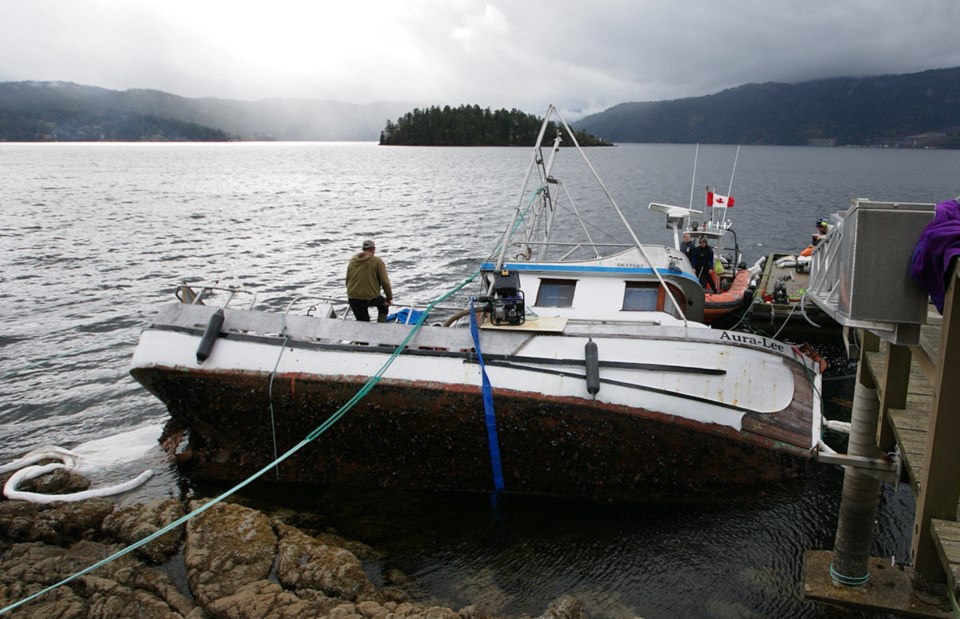If B.C. Ferries officials had it to do over again, they would make the same decision to cancel sailings as they did on Saturday, says spokeswoman Deborah Marshall.
With high winds predicted, B.C. Ferries cancelled 17 sailings on four main routes from 3 p.m. onwards — Tsawwassen-Swartz Bay, Tsawwassen-Duke Point, Tsawwassen-Gulf Islands and Departure Bay-Horseshoe Bay — along with sailings on several smaller routes.
Marshall said she talked to staff in Ferries’ operations department Monday “and they still felt we would have been outside the parameters of safety.”
On Saturday, winds on the water picked up during the day, she said.
“Had we sailed those 3 o’clock sailings, they couldn’t have gotten back,” she said. “It would have been extremely rough trying to sail the 5 o’clocks because it’s a round trip.”
The decision on cancellations was made early in the day because of the potentially severe weather that was forecast, Marshall said. The early call also provided travellers with a heads-up, she said.
It is not a step that is taken often, but a similar scenario happened last December, Marshall said.
“Safety is the No. 1 priority.”
No estimate on lost revenue was available.
Environment Canada meteorologist Matt MacDonald said that although the Victoria area was spared the brunt of the Saturday storm, with its centre making landfall near Bamfield about 7 p.m., strong winds were still recorded around the south Island.
Winds at Saturna Island reached 98 kilometres per hour, gusts up to 96 kilometres/hour were recorded at Trial island, Tsawwassen had wind speeds up to 71 km/h and Victoria International Airport saw 76 km/h wind.
The peak wind in B.C. was 109 km/h recorded at Sisters Island, off Qualicum Beach.
B.C. Hydro spokesman Ted Olynyk said that although the storm was not as severe as feared, people should focus on being prepared.
“I hope people don’t become complacent as a result of this storm,” he said. “At the end of the day, it’s not up to the meteorologist how fierce it is. It’s Mother Nature’s call.”
At Victoria’s Douglas Street Canadian Tire store, last week saw a run on everything from flashlights and batteries to generators and camp stoves as people got ready for the weather. Some picked up sealant for repairs to windows and gutters.
MacDonald said the weather system had the potential to be very powerful. Forecasters have to look at the worst-case scenario, “hoping it won’t materialize,” he said.
“It looked really ripe for a major storm,” he said of the system. “The impacts were felt, they just weren’t as widespread.” He noted that while some people were posting on social media, asking where the storm was, others were sending along pictures of downed trees in their yards.
“We tried to err on the side of caution, and I think that way is the best,” MacDonald said.
Among the communities where the storm hit hard was Port Renfrew. Raphaelle Michel of the Soule Creek Lodge said strong winds Saturday night were accompanied by a power outage that hit the lodge about 7 p.m. and lasted until 10 p.m. Sunday.
There were also outages in the community on Thursday and Friday nights, Michel said.
“I guess there were a couple of lines down right here in town and a few trees that were blocking access.”
Several other areas of Port Renfrew had to deal with branches and debris. Locals pitched in to help with the cleanup by using their chainsaws, said Ian Laing of the Renfrew Pub and Seaside Cottages.
He said he has a generator that kept his businesses going during the storm.
Laing estimated Saturday wind speeds in Port Renfrew at 80 km/h.
Port Alberni Mayor Mike Ruttan said the storm did not cause major damage in the city. A few trees toppled, but there were no flooding issues, he said, except for pooling water in some fields.
“One of my neighbours had a tree come down and just miss his house by literally a few centimetres,” Ruttan said.
Olynyk said the Saturday storm, combined with the week’s previous two storms, affected 285,000 customers around B.C. with power outages — 103,000 of those on Vancouver Island. The bulk of the Saturday outages on the Island were in the central and northern areas, he said, with almost 90,000 customers affected by 10 p.m. Saturday.
The Victoria area peaked at 8,000 customers with outages Saturday and Nanaimo at 14,000. Power was restored relatively quickly in most cases, helped along by B.C. Hydro staggering the deployment of crews for around-the-clock coverage, Olynyk said.
Meeting the demands posed by last week’s weather, including the Saturday storm, posed a challenge for the Greater Victoria Extreme Weather Protocol — a program to help people in need with shelter during fall and winter conditions.
The 50 mats set up at the Our Place were all in use Saturday night, program co-ordinator Jen Wilde said.
“We were absolutely fully booked,” she said. “We had nowhere near enough opened to be able to accommodate everyone.”
A “warming station” was also set up at Our Place so that people could spend time inside, Wilde said. The Salvation Army and Rock Bay Landing shelter had warming stations as well, she said.
The program starts Nov. 1, but since stormy weather came earlier than expected, efforts were made to get up and running ahead of schedule, Wilde said.



